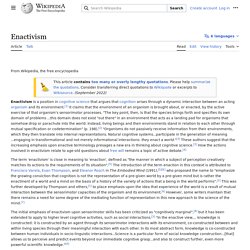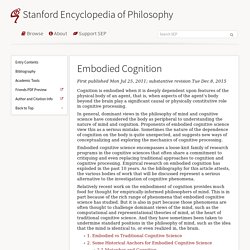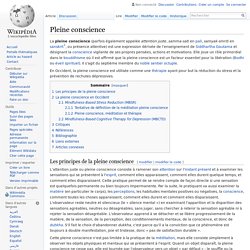

Le paradigme de lénaction aujourdhui. L'ÉNACTION ET L'ART SONORE NUMÉRIQUE - Juan Rodrigo Garcia Reyes. Dialogue entre la philosophie et les sciences cognitives avec Michel Bitbol & Francisco Varela. Maa limsi.
CognitionIncarnePDL Lyon2014. A Survey of Artificial Cognitive Systems. Enactivism. Enactivism argues that cognition arises through a dynamic interaction between an acting organism and its environment.[1] It claims that our environment is one which we selectively create through our capacities to interact with the world.[2] "Organisms do not passively receive information from their environments, which they then translate into internal representations.

Natural cognitive systems...participate in the generation of meaning ...engaging in transformational and not merely informational interactions: they enact a world. "[3] These authors suggest that the increasing emphasis upon enactive terminology presages a new era in thinking about cognitive science.[3] How the actions involved in enactivism relate to age-old questions about free will remains a topic of active debate.[4] Philosophical aspects[edit] "Enaction is the idea that organisms create their own experience through their actions. Embodied Cognition.
1.

Embodied vs Traditional Cognitive Science Consider four evocative examples of phenomena that have motivated embodied cognitive science. We typically gesture when we speak to one another, and gesturing facilitates not just communication but language processing itself (McNeill 1992). Vision is often action-guiding, and bodily movement and the feedback it generates are more tightly integrated into at least some visual processing than has been anticipated by traditional models of vision (O'Regan and Noë 2001).
There are neurons, mirror neurons, that fire not only when we undertake an action, but do so when we observe others undertaking the same actions (Rizzolatti and Craighero 2004). Traditional cognitive science has certainly conceptualized central cognitive processing, what we will call cognition in thenarrow sense, in abstraction from bodily mechanisms of sensory processing and motor control. We follow recent authors (A. 2. An enactivist cognitive architecture based on sensorimotor modeling. Origins and evolution of enactive cognitive. Esprit étendu clarkchalmers. Autopoïèse et conception en architecture Patrick Barrès. TOWARD A GENERAL THEORY OF ENACTION.
Enactive07 Proceedings LQ. Stewart J., Gapenne E. & Di Paolo E. A. (2010) Introduction [2289] Stewart J., Gapenne E.
![Stewart J., Gapenne E. & Di Paolo E. A. (2010) Introduction [2289]](http://cdn.pearltrees.com/s/pic/th/stewart-gapenne-introduction-123467962)
& Di Paolo E. A. (2010) Introduction. In: Stewart J., Gapenne E. & Di Paolo E. A. Francisco Varela : reflections on Consciousness. Evan Thompson, PhD - Context Matters: Steps to an Embodied Cognitive Science of Mindfulness. John Dunne, PhD. Understanding Mindfulness: Heuristic Accounts. Unified Cooperative Enactive Social Cognitive Artificial System for Solving Real World Problems. ENACTION de carlotta piccinini.
Pleine conscience. Un article de Wikipédia, l'encyclopédie libre.

La pleine conscience (parfois également appelée attention juste, samma-sati en pali, samyak-smriti en sanskrit[1], ou présence attentive) est une expression dérivée de l’enseignement de Siddhartha Gautama et désignant la conscience vigilante de ses propres pensées, actions et motivations. Elle joue un rôle primordial dans le bouddhisme où il est affirmé que la pleine conscience est un facteur essentiel pour la libération (Bodhi ou éveil spirituel). Il s’agit du septième membre du noble sentier octuple. En Occident, la pleine conscience est utilisée comme une thérapie ayant pour but la réduction du stress et la prévention de rechutes dépressives. Les principes de la pleine conscience[modifier | modifier le code] Mindfulness - An introduction with Jon Kabat-Zinn. Davos 2015 - The Human Brain Deconstructing Mindfulness.
Richie Davidson - The Emotional Life of Your Brain (Complete) Francisco Varela Lecture Series: "Well-Being Is a Skill" with Richard J. Davidson, PhD. Théorie autopoïètique du droit. Law as an Autopoietic System. How the Law Thinks: Toward a Constructivist Epistemology of Law. Constructing reality: How our brains create the world we perceive.